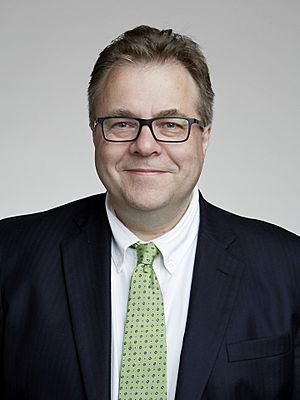Mark A. Lemmon facts for kids
Quick facts for kids
Mark Lemmon
|
|
|---|---|

Lemmon in 2016
|
|
| Born | 1964 (age 60–61) Norfolk, England
|
| Education | Norwich School |
| Alma mater | |
| Spouse(s) | Katherine Ferguson |
| Scientific career | |
| Fields |
|
| Institutions | |
| Thesis | Specific interactions between transmembrane alpha-helices: Their role in the oligomerisation of integral membrane proteins (1993) |
| Doctoral advisor | Donald Engelman |
Mark Andrew Lemmon, born in England in 1964, is a very important scientist. He is a biochemist who studies how our bodies work at a tiny level. He is a professor and leads a department at Yale University. He also helps run a special institute that studies cancer. He is known for his work on how cells communicate.
Contents
Mark Lemmon's Early Life and School
Mark Lemmon was born in 1964 in Norfolk, England. He grew up in towns called Taverham and Poringland. He went to Norwich School from 1976 to 1983.
After that, he studied at Hertford College, Oxford University. He earned a top degree in biochemistry in 1988. Biochemistry is the study of the chemical processes happening in living things.
He then went to Yale University for his PhD. There, he studied tiny parts of cells called alpha-helices. These are like tiny spirals that help proteins work.
Mark Lemmon's Science Career
After finishing his PhD, Mark Lemmon continued his research. He worked at New York University for a while. Then, he moved to the University of Pennsylvania. He became a professor there and later led a department.
In 2015, he moved to Yale University. He is now a top professor there. He also directs the Cancer Biology Institute.
What Mark Lemmon Studies
Professor Lemmon's research combines different science fields. He uses biochemistry and structural biology. Structural biology looks at the shapes of molecules. He also uses cell biology, which studies how cells work.
His main focus is on how cells communicate. Cells have tiny antennas on their surface called receptors. These receptors receive signals from outside the cell.
He studies special receptors called growth factor receptors. These receptors tell cells to grow and divide. One important one is the epidermal growth factor (EGF) receptor.
Understanding Cancer
Mark Lemmon's work helps us understand cancer. Sometimes, growth factor receptors get stuck "on." This makes cells grow too much, which can lead to cancer.
He studies how these receptors get activated wrongly in cancer. This knowledge is super important for making new cancer medicines. His goal is to use his understanding to help people with cancer.
His research has been supported by big organizations. These include the National Cancer Institute. This institute helps fund research to find cures for cancer.
Mark Lemmon's Work in Science Journals
Professor Lemmon also helps share new science discoveries. He is on the team that reviews articles for several important science journals. These include Cell and Molecular Cell.
He used to be an editor for the Biochemical Journal. In 2021, he became the head of its editorial board. He also served as a secretary for the American Society for Biochemistry and Molecular Biology.
Awards and Special Recognitions
Mark Lemmon has received many awards for his important work.
- In 2016, he was chosen as a Fellow of the Royal Society (FRS). This is a very high honor for scientists in the UK.
- In 2023, he became an ASBMB Fellow.
- In 2024, he was made a Member of the Connecticut Academy of Science and Engineering.
- In 2012, he won the Dorothy Hodgkin prize from the Protein Society. This award recognizes important discoveries about proteins.

